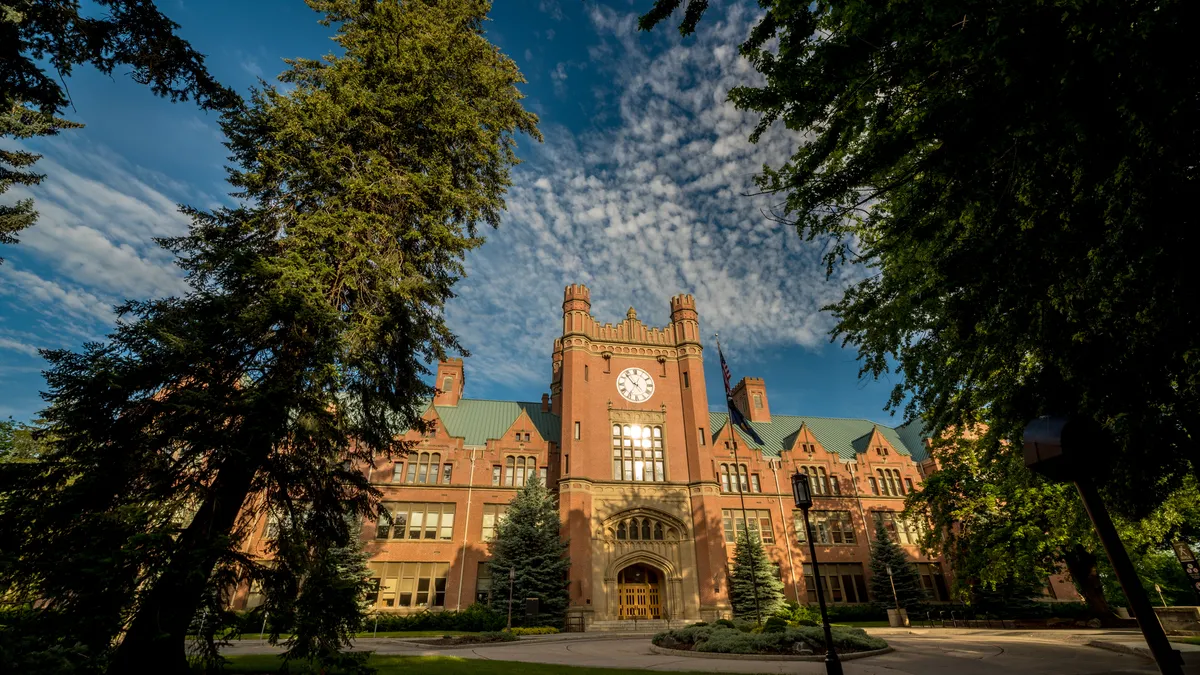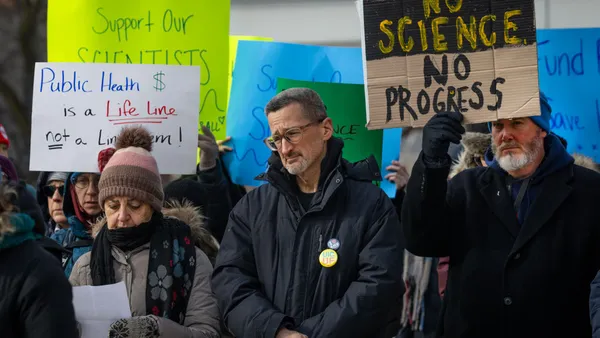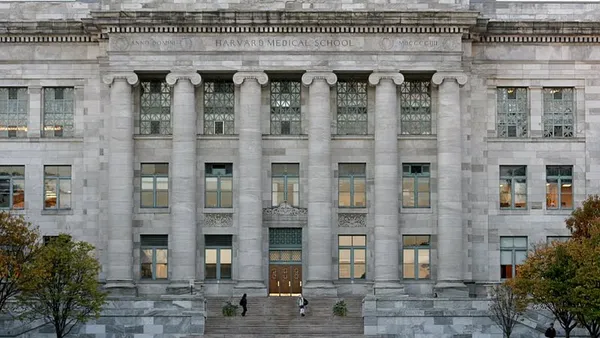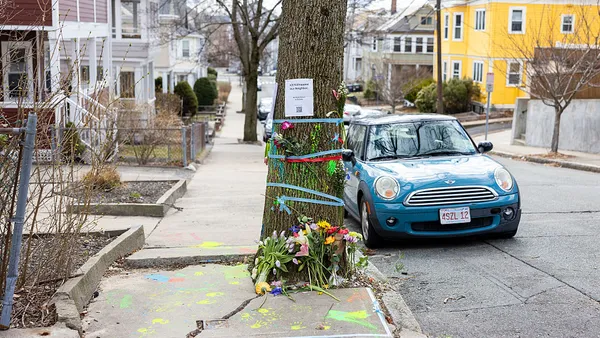Dive Brief:
- The Idaho State Board of Education unanimously approved a resolution Wednesday that largely bans diversity, equity and inclusion programming at the state's public four-year colleges: Boise State University, the University of Idaho, Idaho State University and Lewis-Clark State College.
- Under the resolution, the colleges can neither operate student resource or success centers nor have policies or initiatives based on “DEI ideology.” It also bans colleges from requiring students and employees to share their preferred pronouns and prohibits the consideration of personal identity characteristics in education and hiring decisions.
- The board defined DEI ideology as any approach that prioritizes personal identity characteristics — race, color, sex, sexual orientation, national origin, religion or gender identity — over individual merit. The affected colleges have until the end of June to comply.
Dive Insight:
The resolution's stated goal is to ensure "all students may succeed regardless of personal identity characteristics." But critics of the move have raised concerns over the effects it will have on students from backgrounds underrepresented in higher education.
The Idaho board adjusted the proposal's language this week amid pushback from faculty and students.
Among other changes, the resolution now defines DEI ideology, includes a line acknowledging "the unique diversity of Idahoans," and sets the expectation that colleges continue "to foster a campus culture that appreciates and reflects this diversity."
Board members also set the effective date as mid-next year.
TJ Bliss, the Idaho State Board of Education’s chief academic officer, said the June 30 deadline is intended to give colleges adequate time to make changes.
"Some have begun already. Some have a lot more to do," he said.
Last week, Boise State announced the abrupt closure of its Gender Equity and Student Equity centers. In their place, the institution will open the Student Connections and Support Center, per an email obtained by the Idaho Statesman.
Idaho State announced last month it would restructure its Office of Equity and Inclusion and rename it the Office of Equal Opportunity.
The university is also dissolving its Diversity Resource Center and Gender Resource Center and integrating the resources they offered into broader student support services, President Robert Wagner said at the time.
Idaho State acted ahead of the board's vote so it could make decisions it could control, Wagner told the board Wednesday.
"We have not done away with programs," he said. "What we are doing is reorganizing where those programs originate from and who is administering those programs."
The state's public flagship, the University of Idaho, appears to have braced for change as well.
The institution recently informed faculty that four of its student centers — the Black/African American Cultural Center, the Women’s Center, the Office of Multicultural Affairs and the LGBTQA Center — would all close, according to Sydney Freeman Jr., an education professor at the university.
Freeman, who helped lead the Black/African American Cultural Center, said the decision was "based on the instruction of the Idaho State Board of Education and due to pressure of members of the Idaho State Legislature."
"Our Black students and others did all they could to resist this outcome, but the decision was already made," he said in a social media post on Monday.
The University of Idaho did not immediately respond to a request for comment Wednesday.
University of Idaho President C. Scott Green told the board prior to the vote that students value the kinds of affinity centers and groups that will no longer be possible under the policy change.
"These students often have a lot of the same issues, and they can help each other through them — that's why those programs are there," he said. He added the university has seen more students make it to graduation because of support from speciality groups.
Green affirmed the flagship would comply with board policy and state law in both letter and spirit. But he also expressed discontent with the pending change.
"We all recognize the broader national-state political dynamics that our Board of Regents is addressing," he said. "We are disappointed, but not surprised, that it has come to this given what has happened in other states."
Since 2023, 12 states have signed anti-DEI legislation into law, according to The Chronicle of Higher Education. The shift comes amid a conservative-led effort to roll back diversity efforts in education.
Boise State President Marlene Tromp expressed concern that students and community members would feel devalued in the face of the program discontinuations.
“It grieves me very deeply that, for many years, our work to support and serve our students so they can be academically successful has been profoundly misunderstood and misconstrued,” she told board members.
The Idaho education board issued guidance added to the new policy to make clear the state’s public four-year colleges can offer support services for certain groups, such as veterans and first-generation students.
The allowable exceptions also include members of federally recognized American Indian tribes, of which there are seven in the state. Permitted practices include maintaining a designated American Indian student center and offering scholarships for American Indian students.
Before the vote, Samuel Penney, a member of the Nez Perce Tribal Executive Committee and education liaison for the tribe, expressed concern to the board about the potential loss of DEI programming.
"The transition to campus life can be extremely difficult," he said, noting that students from reservations often come from close-knit communities but graduate from underperforming public schools. "Having helpful college staff assist them with transition can be life changing."
Board members had assured the Nez Perce Tribe that the proposed DEI ban would not impinge services affecting its students, Penney said. But he dismissed the idea that diversity programming creates division among students — a common refrain among its opponents.
"The programs under review are effective tools in not only attracting people to pursue a degree in Idaho, but also retaining those students and seeing them through to graduation," he said.
Lewis-Clark State officials do not anticipate needing to make changes based on the resolution, President Cynthia Pemberton told the board, as its specialized student support services are for veterans and Native American students — two exempt groups.
This resolution does not address Idaho's public community colleges.
Some colleges have rolled back DEI programming ahead of potential bans, which often give them little time to make changes.
In Idaho, Republicans hold the governor's office and a veto-proof supermajority in the Legislature, and colleges are likely to face further challenges to DEI. Lawmakers recently created a task force to investigate DEI and social justice ideology at Idaho colleges.
In 2021, the Legislature passed a law banning the state’s public colleges and K-12 schools from compelling “students to personally affirm, adopt, or adhere to” certain concepts related to sex, race, ethnicity, religion, color, or national origin. Because bills like these contain ambiguous language that could be misinterpreted or misapplied, free speech group PEN America labeled the legislation an “educational gag order.”
The same year, lawmakers cut $2.5 million in state funding for social justice programming from the three public universities.
In 2023, the state education board banned Idaho’s four-year public colleges from using diversity statements — which outline job candidates’ experiences with and commitment to diverse student populations — in their hiring processes. The Legislature similarly banned all public colleges from using such statements in hiring and admissions the following spring.












